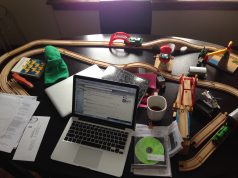
What is performance? Is it reciting rehearsed lines to an audience? Is it adopting new behaviours? Is it getting into a costume? Is it a series of truths and lies that we tell to ourselves in order to become someone who we aren’t? If it is any or all of these things, then one can understand how performance is intertwined with our everyday routines. Performance is not an act that is restricted to the stage or the screen, rather, it is the simple act of making choices that affect how we present ourselves to the world.
We rehearse our roles our entire lives, by making a series of choices every day that with trial and error teach us how to be the character we want to be. From a young age, we learn what lines will get what reactions out of our parents, teachers, and friends. The more we rehearse, the quicker we get at understanding the script. Soon—actions, such as crying, can be a performance of sadness, happiness, or ‘trying to get out of something-ness’. Our understandings of the play evolve and our roles become more complex and restricted: “don’t do that in public” “use your indoor voice” “say that in your interview” etc etc.
All of these everyday performances can be explicitly seen in the way we perform gender, just ask Judith Butler. To her, gender is “a stylized repetition of acts . . . which are internally discontinuous . . .[so that] the appearance of substance is precisely that, a constructed identity, a performative accomplishment which the mundane social audience, including the actors themselves, come to believe and to perform in the mode of belief”

Therefore a drag performance (specifically the sub-genre of drag done in Portlandia) works in two central ways: it highlights the fact that gender is something that is performed—an person/actor of any biological sex is able to perform any gender by simply making the choices that align with ‘man’ and ‘women’. Secondly, it works to erode the idea that gender is linked to sex, and emphasizes that it is a spectrum full of choice.
We are fortunate in our society that some entertainment and television shows are liberal and conscience enough to be bringing forth interesting and dynamic discussions about gender into the forefront of our media. The popular television show Portlandia has created a format where the two main creators/ writers/actors, Carrie Brownstein and Fred Armisen, play all of the central characters. This encourages viewers to accept the notion that the body can be a blank slate for characters to be imposed on to. The show indirectly (and sometimes overtly) sends important messages like ‘it’s okay to be who you are’ and ‘feminism is cool’. Portlandia has had six successful seasons and counting.
Portlandia constantly reminds its viewers that the actors are performing. By often performing in drag and ‘bending genders’, Portlandia reveals to viewers the artifice of the characters. They show that the actors are performing, similar to the ways in which we are all performing in our daily routines of inhabiting gender. By using simple wigs, costumes, and limited makeup (i.e. no special effects or movie magic-type of make up) Portlandia aligns television performances to everyday performances. In addition, the show’s use of drag isn’t just out of ‘necessity’. While one might assume that Armisen and Brownstein only get in drag when they need to perform a same sex relationship (be it an intimate one, friendship, or between strangers, etc.), they would be wrong. The popular returning sketch, “Nina and Lance”, where Brownstein plays the male, Lance, and Armisen plays the female, Nina, is a perfect example of how the show actively explores the body and gender performances
While Armisen’s shrill falsetto and Brownstein’s digitally modified baritone do work towards creating humour in the scene, these conventions enhance the performance by poking fun at the situations the characters find themselves in. By no means are the altered voices or drag performances meant to be interpreted as an attack on transgendered people or drag performers like some believe. Instead, the show hyperbolizes and criticizes the gender binaries that our society has created.
By creating an environment where gender and biological sex are no longer linked for the purposes of creating a straightforward storyline, Portlandia evades gender binaries altogether. Portlandia is an experimental hybrid formed from the web-series, sketch comedy, and mockumentary genres, thus creating an entirely new type of show with current and poignant subject matter. The show’s use of humour entertains audiences and helps to engage them in the incredibly informative and valuable messages being explored.









